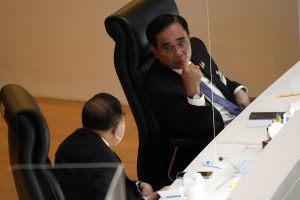Thailand’s Prime Minister Prayut Chan-o-cha has survived his fourth parliamentary vote of no-confidence, his last major political test prior to elections next year. The former army chief, who has led the country since staging a coup d’etat in 2014, received 256 votes in favor and 206 against with nine abstentions during a vote in parliament on Saturday. Three deputy prime ministers and seven other cabinet members also survived the vote of confidence.
The vote, which followed four days of televised hearings in which the 68-year-old leader was grilled by opposition members, ensures that Prayut serve as prime minister until his term ends in March 2023.
The opposition called for a vote of no-confidence in Prayut and his colleagues on the grounds that they had mishandled the economy and ignored corruption.
During the four days of televised questioning, Cholanan Srikaew, the head of the opposition Pheu Thai party, an electoral vehicle for exiled former Prime Minister Thaksin Shinawatra, described Thailand as “a coma patient” and said that it was “overwhelmed with debts because of this government.” He also accused Prayuth of ignoring corruption in government agencies.
The opposition also accused Prayut’s administration of surveilling political dissidents with the Israeli-made Pegasus spyware, and of legalizing cannabis without proper controls.
Despite the ruling Palang Pracharath Party having faced a recent bout of political infighting – the party last year sacked its controversial Secretary General Thammanat Prompao and 20 other ministers – it closed ranks in the face of the opposition attacks. Government spokesperson Thanakorn Wangboonkongchana said that Prayut had been vindicated by the outcome, Reuters reported.
“During the censure debate in the past few days, the issues raised by the opposition contain some incorrect information and the government has used this opportunity to clarify things,” Thanakorn said. “Now that the censure debate is completed we urged the opposition to work with us for the people and the country.”
It was the fourth time Prayuth’s performance in office had been put to a vote since the deeply flawed national election of March 2019, which was less a fair and transparent vote than a stage-managed electoral exercise designed to give Prayut’s coup a stamp of democratic legitimacy.
As with the previous three confidence votes, Prayut’s victory was unsurprising – his coalition holds 253 seats, more than the 239 needed to survive a censure motion – but the fact that the opposition have sought to undermine Prayut at every turn speaks to his fragile legitimacy. It also reflects a certain sense of powerlessness on the part of the opposition, which recognizes the extent to which the board is tilted in favor of Prayut’s government.
The administration, and the military-monarchic elite that it represents, has shown few compunctions about stretching democratic norms and practices in order to solidify its hold on power.
For instance, in February 2020, a conservative judge ordered the disbanding of the Future Forward Party on a trivial technicality. The newly-formed party had come in third in the 2019 election, after mobilizing the votes of Thai youth, and its banning was one of the catalysts for the campaign of pro-democracy protests that unspooled throughout the second half of 2020. The protests gave voice to a profound discontent about the state of Thai politics, and saw young activists make radical calls for reform of the country’s monarchy, something that is outlawed under Thailand’s lese majeste law.
Since then, Prayut’s administration has spared no effort to see off this political challenge, charging more than 100 prominent protests leaders and political activists, including two former leaders of Future Forward, with lese majeste. All this sets the stage for a bitter electoral battle at next year’s election and suggests that the polls, conducted under the same military-drafted constitution as the last election, will fail to resolve the legitimacy crisis that has gripped Thai politics for more than 15 years.

































